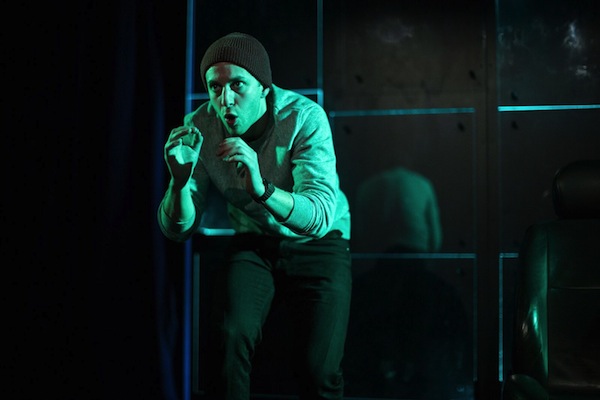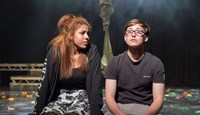- News
- Guest-Blog-Ballistic
Guest Blog - Ballistic

Writer Alex Packer and performer Mark Conway spoke to London Calling (LC) about Ballistic, inspired by school shooter Elliot Rodger and the 140-page manifesto he left behind...
LC: Alex, you wrote the play, what is Ballistic about?
AP: Ballistic is about a young man who grows up and goes on to commit a violent act. It charts his life from being a 12-year-old child through to teenager to early twenties. It’s mostly fictionalised but a lot of it is sourced or inspired by the story of Elliot Rodger and his document “My Twisted World” which takes a similar approach.
LC: Reading the manifesto, two things emerge: narcissism and entitlement but also loneliness, which seems to be an epidemic issues of our time, maybe especially for men?
AP: I think so, yes. It’s never been easy for men to talk, with the way we are brought up. There is this whole perception of what it is to be a man, it’s this ideology and it’s actually completely false and now I think it’s more dangerous than ever. Young people today grow up immersed in social media and their own world online rather than real life interactions. We are now in a place where young people are not habitually forming relationships or attachments and it’s become easier to distance yourself and go down these treacherous paths.
MC: I think maybe it used to be a little bit easier to know what it was to be a man. The role was simpler and more defined. Now women are trying to gain equal rights and equal pay - as they should - so men suddenly feel like their reality has been taken away. Which is why you get the rise of these men’s rights groups and it is fascinating! They feel that feminism is somehow kneecapping them. When you sit in your bedroom reading this and a faceless online community supports the thoughts or doubts that you’ve been having then it becomes a really dangerous echo-chamber.
LC: You have a female director, Anna Marsland, working on this play about masculinity. Was that important?
AP: Vitally important! There was a real danger of only seeing the male perspective with just the two of us, it could become warped in a way. So it was fantastic having Anna involved, having that third dynamic and a really vital female perspective on it.
MC: Something she spotted that we never really addressed was this entitlement to own a woman. The female viewpoint that Anna brought was crucial and it is now one of my key ways into the character.
LC: Social media can work like an amplifier for people leading this double life. Elliot Rodger’s online persona was apparently fantastically different to the shy, socially awkward reality.
AP: Social media gives you the opportunity to embellish your narcissism. If you already have those ideologies than this is your feeding ground. In Elliot Rodger’s YouTube videos he is full of swagger! And that’s one of the massive things that interest me in that story and in our character in Ballistic: that conflict of the front face and trying to attain it and the vulnerability inside.
MC: He is not a psychopath. That would mean a void of emotion in the clinical sense and a lack of empathy, whereas he doesn’t seem like that. There’s emotion, there’s tears, there’s frustration. He is human.

(c) Tom Packer
LC: One of the most shocking things is how relatable he actually is. All of us experience bullying, rejection or disappointment at some point, it is part of life. What pushes one person over the edge?
MC: This came up in rehearsals. All those things that young boys go through, sexual messing ups and fails with girls, wanting to be popular. And I thought: “That stuff all happened to me. And I’d forgotten about it until now.” I got over it. We pull ourselves out of it or maybe have a friend support network, a family member, something. But with him it’s a spiralling loss of reality. That’s the closest I get to answering it but in truth – we don’t know! That’s what the play wants to ask: why did this happen to this human and will it happen to people you know and can you stop it?
LC: These violent attacks that repeatedly happen are always reported as separate incidents. The killer is often portrayed as “a monster” but without investigating maybe the bigger overarching commonality they all have?
AP: It’s really fascinating how the story is presented in media. They love the drama, they love the angle and as human beings we love stories, that’s why we tune in, even if it’s horrible. But there is this very, very massive question of why? We would love to distance them, we love to explain it with he was neo-Nazi or a racist or a misogynist or a psychopath and we put them in a box. But it’s more complex than that.
MC: It happens a lot in America and we understand the culture of gun violence. But this play isn’t set in America. These acts of terrorism happen in Germany, in Scandinavia, in Japan. People are always waiting to find out what it is and when they see it wasn’t a terror attack we can just distance it as a lone wolf, this person doesn’t belong in our safe society. And that’s not the right narrative. They are a part of your society and they are failed by education, by mental health cuts, there was probably something that could have been their lifeline.

(c) Tom Packer
LC: Do we as a society have a responsibility? Elliot Rodger rejects all responsibility, he just blames everyone else
AP: He wallowed in self-pity, constantly passing the responsibility: “It’s other people’s fault” and “why don’t women like me”. But the more you look into these stories there are often things that are very normal and the Elliot Rodger story really raises that issue: he wanted wealth, love, a family - we all want those things.
MC: I think there is absolutely a duty of care. For the character in our play, there are instances where he could be saved, maybe, if somebody had said a kinder word or somebody had noticed.
LC: After the recent events in Florida, I read this quote from one of the teachers: “We could not have been more prepared for this situation... We did everything that we were supposed to do.”
MC: It's incredible how much time is spent drilling and drilling these children what to do in case of an attack. I also read that children had been permitted to wear bulletproof backpacks in Florida to increase their safety. All these measures aren't as good as providing strong mental health care services for at-risk young people.
AP: It's all pointless if the most important warning signs are brazenly missed. Reports are emerging about the perpetrator's social media accounts, supposedly even reported to the authorities. Yet he slips through the net because someone along the way has chosen to ignore it. Is it laziness? Or ignorance? Or stupidity? Someone needed to act. And yet again no one did and we have more dead children. It's heartbreaking.

(c) Tom Packer
LC: Thinking about Elliot Rodger’s dreams of grandeur and being special and god-like and this short lived celebrity you get from committing a violent act - do we spur this on by giving them the airtime?
AP: I feel passionately about this. This is the crux of it. If someone is feeling bullied and feeling really small what’s a way to become the biggest thing worldwide? Because we live in a world of 24 hour news, within minutes of being identified their faces are plastered worldwide. It’s celebrity, it’s fame and it’s incredibly dangerous. It can act as a calling card, an inspiration for people.
LC: But on the other hand we do need to talk about it
MC: Absolutely. We don’t want to fall into the bracket of celebrating it. But if nobody does anything, nothing will happen so the reason we did the play is to do something, to provoke a conversation and theatre is a way to do that.
AP: Theatre has a real power to speak to people and I hope Ballistic at least gets a few people thinking differently about vulnerable and violent young men and how we can prevent further atrocities happening.
This interview first appeared at www.londoncalling.com/features








Conversations